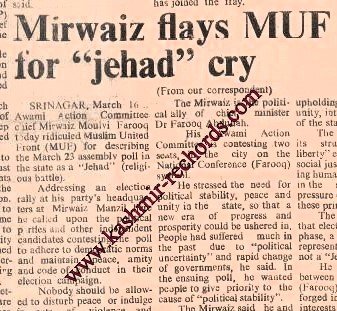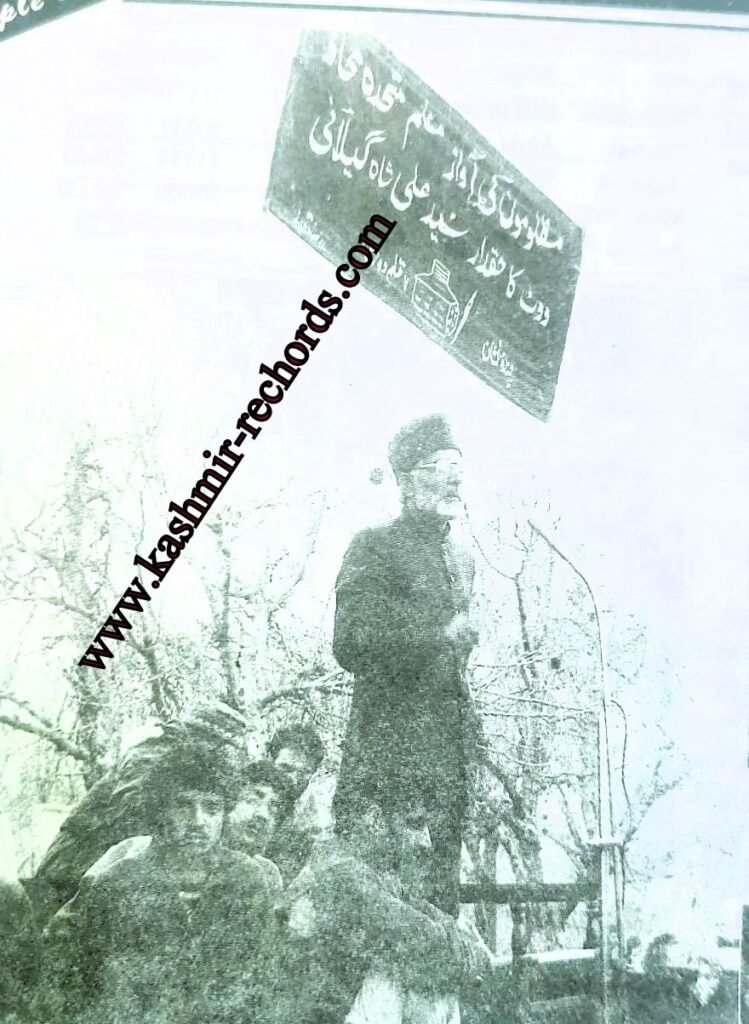(Kashmir Rechords Exclusive)
In the wake of the Anantnag riots of 1986, the Muslim United Front (MUF) had emerged as a coalition of various separatist factions, including the Jammu and Kashmir Jamat-e-Islami. Their campaign was steeped in religious rhetoric, framing the elections as a form of “Islamic Jehad” .
The 1987 State Assembly elections in Jammu and Kashmir marked a pivotal moment in the region’s political history, characterized by unique circumstances that would influence its political landscape for years to come. This election not only facilitated the rise of separatist organizations but also underscored the intricate relationship between religion and politics in the area. For the first time, the elections in Kashmir were intertwined with the concept of “Jehad” (religious struggle).
In the wake of the Anantnag riots of 1986, the Muslim United Front (MUF) had emerged as a coalition of various separatist factions, including the Jammu and Kashmir Jamat-e-Islami. Their campaign was steeped in religious rhetoric, framing the elections as a form of “Islamic Jehad” aimed at rallying the sentiments of the populace. This strategy proved effective in consolidating the MUF’s separatist ideology, particularly post election, as allegations of electoral rigging began to surface against the ruling party, which feared losing its grip on power.

Flayed for `Jehad’ Cry
Amidst the fervor of the MUF’s campaign, one voice stood out as a beacon of sanity: Mirwaiz Moulvi Farooq. As the leader of the Awami Action Committee (AAC), he publicly ridiculed the MUF’s characterization of the March 23, 1987 elections as a “Jehad.” At an election rally at his party headquarter “Mirwaiz Manzil’’ on March 16, 1987, Mirwaiz Farooq had urged all political parties and independent candidates to adhere to democratic norms, emphasizing that elections were a means to elect a representative government, not a religious battle. His appeal resonated deeply, as it came from one of the highest religious authorities in Kashmir.
Political observers believe that Mirwaiz Farooq’s principled stance had played a crucial role in tempering the fervor surrounding the MUF’s campaign. His call for peace and democratic engagement likely deterred many Kashmiris from succumbing to the separatist rhetoric. Unfortunately, this principled stand came at a grave cost; it earned him the ire of separatist factions, ultimately leading to his assassination on May 21, 1990, during a period of escalating violence in the region.

Aftermath of 1987 polls
The aftermath of the 1987 elections was tumultuous. As the results were announced amidst widespread allegations of rigging, Srinagar erupted in unrest, witnessing arson and the first low-intensity explosions that hinted at the violent plans of separatist elements, which were at crescendo in 1990. The MUF, with figures like Syed Ali Shah Geelani emerging as successful candidates, signaled another chapter in the political narrative of Jammu and Kashmir.

Fast forward to the present, as the 2024 Assembly elections are in the last phase, the concept of “Jehad” in the electoral context has faded into obscurity. Political parties are now primarily focused on the demand for the restoration of statehood, which has become the central theme for the majority of parties, including independents. Some of these independents still maintain allegiance to Jamaat-e-Islami, a group that is now banned in Jammu and Kashmir.
Over three decades ago, Jamaat was part of the Muslim United Front (MUF) that labeled the 1987 Assembly elections as a form of Jehad. However, in the current electoral landscape of 2024, the Jamaat appeared eager to participate in the democratic process, seemingly overlooking its past actions that misled the people of Kashmir—first under the guise of electoral Jehad, then through armed conflict, and ultimately through “Jehad’’ against innocent civilians. Over the past three decades, countless lives have been lost in this turmoil, and now, as the region has transitioned to a Union Territory, the Jamaat’s shift in approach raises questions about its previous commitments and the impact of its past rhetoric.